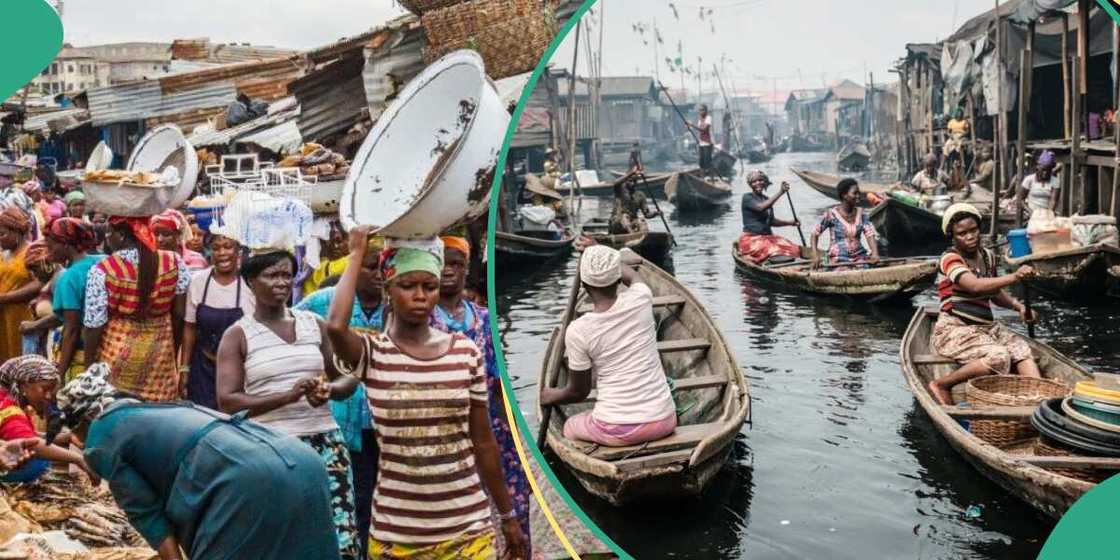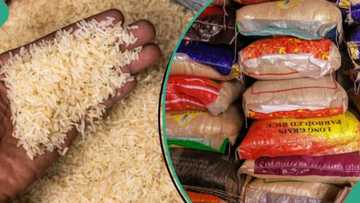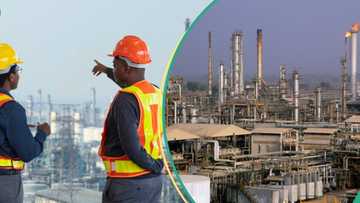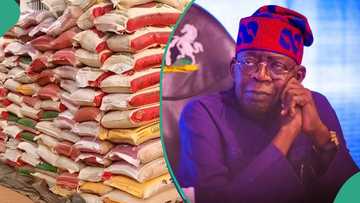Nigeria Missing as South Sudan, Burundi Top List of Poorest African Countries by GDP Per Capita
Legit.ng journalist Victor Enengedi has over a decade's experience covering Energy, MSMEs, Technology and the stock market.
In 2024, economic inequalities persist globally, with several nations experiencing substantial difficulties in Gross Domestic Product (GDP) per capita.
While GDP per capita is commonly used as a metric, adjusting for variations in living costs and inflation rates through purchasing power parity (PPP) provides a more accurate measure of an individual's purchasing power within a country.

Source: UGC
In a previous report, Legit.ng had listed the top countries where the poorest people in the world can be found.
Data provided by Global Finance provides an insight into the top 10 countries with the lowest GDP per capita, shedding light on the economic circumstances that characterize their positions in the international arena.
Here is a list ranking the ten poorest countries, starting from the country ranked tenth and progressing to the poorest country in the world for 2024.
10. Somalia
GDP: $10.42 billion
Population: 17.6 million
Somalia has endured a recurring cycle of crises over the past few decades, marked by severe droughts, conflict, widespread hunger, and fragile governance.
Approximately 70% of Somalis live below the poverty line, and 90% experience "multidimensional poverty," which encompasses low income, limited education access, and inadequate infrastructure.
Despite slight GDP growth averaging around 2% annually in recent years, per capita GDP has declined by approximately 0.8% annually.
9. Madagascar
GDP: $16.77 billion
Population: 25.6 million
Since gaining independence from France in 1960, Madagascar, an island nation off the southeastern coast of Africa, has experienced multiple political crises and military coups.
The current constitution, established in 2014, has brought a period of relative political stability.
Despite being rich in natural resources, the country grapples with internal instability and external interference, hindering the full utilization of its resources. Mining and tourism are significant contributors to its GDP.
8. Liberia
GDP: $4.59 billion
Population: 5,492,486
Liberia's enduring poverty is fueled by violent conflicts, such as civil wars and Ebola outbreaks, leading to unstable infrastructure and limited services.
Forced migration disrupts agricultural activities, contributing to food insecurity.
To address these issues and enhance the country's future, organizations like the World Food Programme are focused on poverty alleviation through sustainable development, education, and healthcare investments.
7. Malawi
GDP: $11.04 billion
Population: 21,390,465
Malawi, situated in southeastern Africa, encounters considerable economic difficulties despite its scenic landscapes. The nation's heavy reliance on rain-fed agriculture makes it particularly susceptible to climate change and volatile commodity prices.
Nevertheless, the government is dedicated to diversifying the economy, enhancing education and healthcare, and alleviating poverty.
6. Niger
GDP: $19.54 billion
Population: 27,844,740
Niger, a landlocked nation in West Africa, confronts significant poverty and economic challenges stemming from its limited natural resources, frequent droughts, and an economy heavily dependent on agriculture.
With 80% of its landmass covered by the Sahara Desert and a growing population dependent on small-scale farming, desertification poses a substantial threat.
5. Mozambique
GDP: $23.96 billion
Population: 34,497,736
Mozambique, a resource-rich nation and former Portuguese colony, faces persistent poverty despite experiencing strong GDP growth.
The country contends with natural disasters, disease, rapid population growth, low agricultural productivity, and significant wealth inequality.
In additiona, attacks by Islamic insurgent groups in the gas-rich northern region further aggravate Mozambique's economic problems.
4. The Democratic Republic of Congo (DRC)
GDP: $15.42 billion
Population: 104,354,615
Despite being the largest country in Sub-Saharan Africa and possessing abundant natural resources such as cobalt and copper, the Democratic Republic of Congo (DRC) faces significant economic struggles.
Approximately 62% of its population lives on less than $2.15 per day. The pervasive poverty is further exacerbated by malnutrition, limited access to education and healthcare, and high fertility rates.
3. Central African Republic (CAR)
GDP: $3 billion
Population: 5,849,358
The Central African Republic (CAR) encounters significant economic difficulties due to political instability, armed conflicts, and inadequate infrastructure.
Although rich in resources such as gold, oil, uranium, and diamonds, the country suffers from pervasive poverty.
The war in Ukraine has increased the cost of essential goods, while extreme weather events like floods and droughts have exacerbated CAR's economic challenges.
2. Burundi
GDP: $3.06 billion
Population: 13,459,236
Burundi, a small landlocked nation in East Africa, grapples with significant socio-economic issues. Development is hindered by political instability, conflicts, and inadequate infrastructure.
The country's rapid population growth intensifies its economic difficulties, with approximately 80% of its citizens depending on subsistence farming, resulting in widespread food insecurity.
1. South Sudan
GDP: $25.83 billion
Population: 11,205,383
Since gaining independence in 2011, South Sudan, the world's youngest nation, has faced significant economic challenges. Political instability, continuous conflicts, and inadequate infrastructure have greatly impeded its development.
The majority of its 11 million inhabitants depend on traditional agriculture, but recurring violence and extreme weather events disrupt farming activities, thereby sustaining widespread poverty.
Why Africa dominates world's poorest
Speaking on why African countries dominate the list of poorest countries in the world, Tunji Andrews, an economist, said this is due to the world due to a combination of historical, economic, and political factors.

Read also
Prices of rice, other food items to crash as Customs is set to begin import waiver, sets rules
He told Legit.ng that colonial exploitation stripped the continent of resources and left a legacy of weak institutions.
He said:
"Post-independence, many African nations faced political instability, corruption, and conflicts, hindering development. Also, economic challenges such as heavy debt burdens, reliance on raw material exports, and inadequate infrastructure limit growth. Climate change and health crises, including HIV/AIDS and malaria, exacerbate poverty."
He added that despite these challenges, there are signs of progress, with some nations experiencing economic growth and improvements in governance, education, and healthcare.
Top 20 poorest states in Nigeria
In related news, Legit.ng compiled a list of the top 10 poorest states in Nigeria and the factors behind their economic struggles.
Despite Nigeria's robust economy and abundant natural resources, poverty still remains high.
According to the report, Sokoto, Taraba and Jigawa led the states with the highest poverty percentage.
The report found out that the North West and North East geopolitical zones have the highest poverty rates in their states.
Proofreading by James Ojo Adakole, journalist and copy editor at Legit.ng.
PAY ATTENTION: Unlock the best of Legit.ng on Pinterest! Subscribe now and get your daily inspiration!
Source: Legit.ng

Victor Enengedi (Business HOD) Victor Enengedi is a trained journalist with over a decade of experience in both print and online media platforms. He holds a degree in History and Diplomatic Studies from Olabisi Onabanjo University, Ogun State. An AFP-certified journalist, he functions as the Head of the Business Desk at Legit. He has also worked as Head of Editorial Operations at Nairametrics. He can be reached via victor.enengedi@corp.legit.ng and +2348063274521.

Tunji Andrews (Co-founder and CEO of Awabah) Tunji Andrews is the co-founder and CEO of Awabah. Andrews is a highly skilled economist, entrepreneur, and committed financial inclusion advocate on a mission to create dedicated financial offerings for Africa’s underserved informal sector. He has over a decade of experience in public and private sector roles across West Africa as an economist (TTAC AFRICA, ResourceDat).






